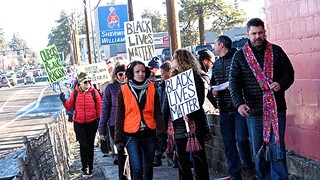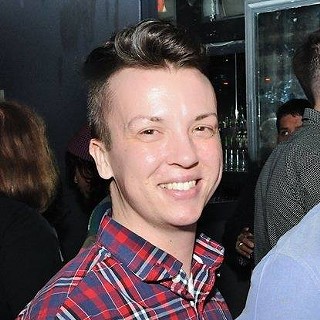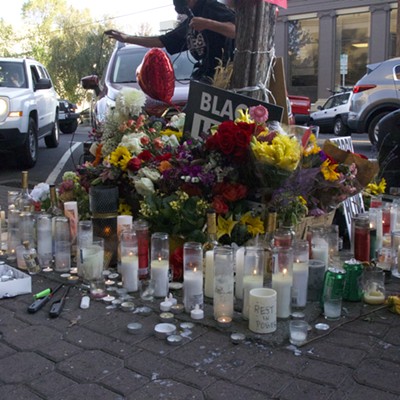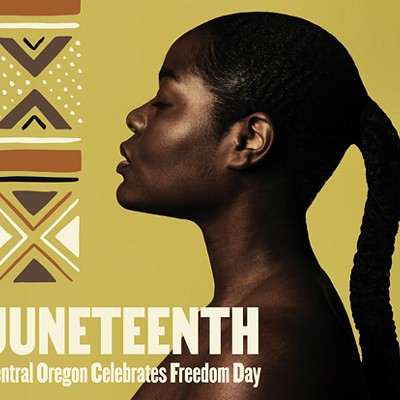From the signs carried by marchers to the name of the event, the statement was simple, yet weighty—"Black Lives Matter."
On Saturday, more than 200 people marched through Bend in solidarity with protestors in cities across the nation, including Washington, D.C. The demonstration, organized by local faith leaders, came about in response to the national conversation sparked by the officer-involved deaths of black men in Ferguson, New York and Cleveland.
Concerned residents of all ages and races joined congregants from First Presbyterian and First United Methodist churches in Bend for songs, speeches and prayers at the first church before walking to the latter. One older white woman sat in a wheel chair, holding a sign that read, "Stop the Holocaust." Interracial couples walked hand-in-hand or pushed their children in strollers. People of color led songs on stage, led the march down the sidewalk, and shared personal stories about their experiences with race.
After the march, 20-year-old OSU-Cascades student Jazzi Wright—who has a black father and a white mother—told the crowd that, growing up in the South, racism was a daily, in-your-face experience. From being called racial slurs to sitting through celebrations of the region's slave-owning heritage, it was a simple fact of life as a black woman.
"When I moved to Bend I was shocked by how people view race," Wright explained, "which was that they didn't. They didn't acknowledge it existed anymore."
Despite this tendency toward so-called color-blindness, she said she still experiences racism. It may be subtler, but it's still there. And while Bend's white majority may be able to imagine race is no longer relevant, she said it's a reality she can't escape.
"I wake up every morning knowing that race matters. My safety and my life depend on me being aware of the way society sees me," Wright explained. "Sometimes in the grocery store people will pull their children away from me, back up and go down different aisles, or pull their belongings closer to them."
She said she has been pulled over by police while riding her bicycle and searched for a car stereo. Her family calls it "Biking while black." Still, Wright and her fellow event organizers acknowledged that Bend is different than other places and therefore requires a different approach.
"Bend is not the South. It's not Ferguson or New York or Detroit or Chicago. Less than one percent of Bend is black, and about 13 percent is Latino," Wright said. "So how can we, as a mostly white community, begin to understand the privilege we have? It's simple. Refuse to look away. Refuse to pretend that racism isn't a problem. Even if you, as a white person living in Bend, rarely if ever see racism actively. Refuse to pretend that skin color doesn't matter, that differences don't matter. We need to eliminate racism, not race."
While the speeches before and after the march made little mention of police, the larger national debate has frequently focused on the relationship between police officers and communities of color. In cities with larger non-white populations, this tension is writ large. But in Bend, some question the relevance of these external dynamics.
Bend Police Chief Jim Porter says that the events that have unfolded in cities where people are protesting the police killings of black men, women and children, feel like they are a world away.
"It's just so far removed from anything we deal with here," Porter explains.
He also cautions against painting the deaths with broad strokes. The circumstances that led to the police shooting of 18-year-old Michael Brown in Ferguson, Missouri, are different than those that preceded the shooting of 12-year-old Tamir Rice in Cleveland, Ohio.
"While people would like to connect them all, you have to look at them individually," Porter says.
In Bend, police rarely use deadly force. Between 2009 and 2013, officers used deadly force just three times—in 2013, 2010 and 2009. The use of force, as outlined in the department's 2013 Force Response Report, generally lines up with racial demographics. That is, people of color do not appear to be subjected to force in disproportionately high numbers.
Porter stresses that police officers are tasked with making complicated judgment calls within seconds, often under the threat of physical violence. He acknowledges that bad cops do exist, but adds that unless the culture of the department supports their behavior, they are typically weeded out early on. Warning signs he looks for include making too many arrests for resisting arrest, challenging authority, being "badge heavy," and getting into too many car accidents.
He's not convinced that the cases currently in the media can be blamed on racism, but concedes it is important for police forces to remain "race neutral." To that end, the department requires officers to go through 30 minutes of race-related training each year. Porter says the department is also kicking up its efforts to recruit diverse staff.
At present, the Bend Police Department is 96 percent white and just one in eight sworn officers are female. The staff includes three employees who identify as Hispanic/Latino and two that are Native Hawaiian/Pacific Islander. There are no black, Asian, or Native American employees.
The department has contracted with a national recruitment service in an effort to attract more minority and Spanish-speaking applicants. So far, the push has garnered more highly qualified female applicants, but not people of color. Porter says he also offers a 3 percent salary bonus to officers who speak Spanish or are willing to learn. Only three officers have taken advantage of the program. The department also has a citizen advisory group that includes representatives from the Latino community.
While Porter seems to recognize the importance of a more representative police force, he does not believe that racism is a major issue in Bend.
"I think Bend's immune from a lot of the closed-minded bigots," Porter says. Growing up on a ranch in Prineville, he says he learned to judge people based on how hard they worked, not the color of their skin. He says he didn't encounter the notion of racism until he was in the military in 1977— just 10 years after the Supreme Court declared laws prohibiting interracial marriage unconstitutional—and surprised a black soldier by taking a bite of his apple.
"He waited to see if I would take a bite after him," Porter recalls.
Fast forward to the present and Porter says he thinks the role of race has been overstated. He's more concerned about the link between a lack of economic opportunity and crime.
"I think the problem is that the conversation is too much about race," Porter explains. "I think the conversation ought to be about opportunities for people of color, our economy not providing living wage jobs for people of color. I think the conversation ought to be about equality period and then we bring it down."
Either way, it's a conversation that's likely to continue. Church leaders say plans are in the works for racial justice reading groups coordinated by the Central Oregon Social Justice Center and efforts to win Bend an official designation as a "welcoming city."






![Get Your Art on the Wall ▶ [with video] (con versión en español)](https://media2.bendsource.com/bend/imager/get-your-art-on-the-wall-with-video-con-version-en-espanol/u/r-bigsquare/12934834/artwatch1.1.jpg?cb=1680199454)




















